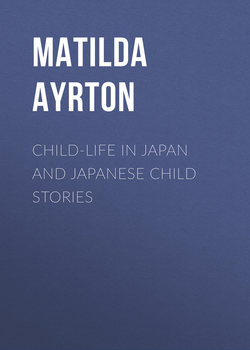Читать книгу Child-Life in Japan and Japanese Child Stories - Ayrton Matilda Chaplin - Страница 4
FIRST MONTH
ОглавлениеLittle Good Boy had just finished eating the last of five rice cakes called "dango," that had been strung on a skewer of bamboo and dipped in soy sauce, when he said to his little sister, called Chrysanthemum: —
"O-Kiku, it is soon the great festival of the New Year."
"What shall we do then?" asked little O-Kiku, not clearly remembering the festival of the previous year.
Thus questioned, Yoshi-san4 had his desired opening to hold forth on the coming delights, and he replied: —
"Men will come the evening before the great feast-day and help Plum-blossom, our maid, to clean all the house with brush and broom. Others will set up the decoration in front of our honored gateway. They will dig two small holes and plant a gnarled, black-barked father-pine branch on the left, and the slighter reddish mother-pine branch on the right. They will then put with these the tall knotted stem of a bamboo, with its smooth, hard green leaves that chatter when the wind blows. Next they will take a grass rope, about as long as a tall man, fringed with grass, and decorated with zigzag strips of white paper. These, our noble father says, are meant for rude images of men offering themselves in homage to the august gods."
"Oh, yes! I have not forgotten," interrupts Chrysanthemum, "this cord is stretched from bamboo to bamboo; and Plum-blossom says the rope is to bar out the nasty two-toed, red, gray, and black demons, the badgers, the foxes, and other evil spirits from crossing our threshold. But I think it is the next part of the arch which is the prettiest, the whole bunch of things they tie in the middle of the rope. There is the crooked-back lobster, like a bowed old man, with all around the camellia branches, whose young leaves bud before the old leaves fall. There are pretty fern leaves shooting forth in pairs, and deep down between them the little baby fern-leaf. There is the bitter yellow orange, whose name, you know, means 'many parents and children.' The name of the black piece of charcoal is a pun on our homestead."
"But best of all," says Yoshi-san, "I like the seaweed hontawara, for it tells me of our brave Queen Jingu Kogo, who, lest the troops should be discouraged, concealed from the army that her husband the king had died, put on armor, and led the great campaign against Korea.5
4
Yoshi-san. Yoshi means good, excellent, and san is like our "Mr.," but is applied to any one from big man to baby. The girls are named after flowers, stars, or other pretty or useful objects.
5
The campaign against Korea: 200 A.D.
